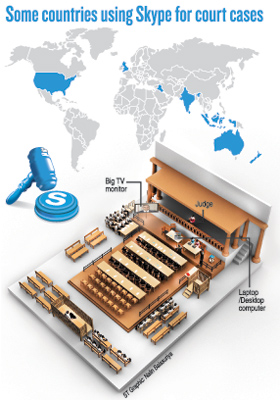News
Skyped evidence set to revolutionise courts
Skype and other technology could become a routine part of courtroom process under plans by the Ministry of Justice – including in the high-profile Khuram Shaikh trial – but gaps in law and expertise need urgent remedy. Secretary to the Ministry of Justice Kamalini de Silva said the ministry was willing to provide courts with any technical support needed.

“The Ministry is in the process of finalising a draft bill on victims and witness protection which contains provisions for recording of evidence or statements through audio visual linkage between a court and other remote locations within the country,” she said.
The difficulty was to find people with the expertise to facilitate this process. Ms de Silva said the Ministry was entering into agreements with a number of countries under the Mutual Legal Assistance Programme. “The Ministry of Justice is the central authority for Mutual Legal Assistance in criminal, civil and commercial matters, and under such laws evidence from persons abroad can be obtained for the purposes of judicial proceedings in Sri Lanka. These laws are reciprocal in nature,” she said.
This month, Colombo High Court Judge Lalith Jayasuriya ordered the use of video call facilities via the internet in a case where a plot of land in Alfred Place, Colombo 3 had been fraudulently acquired without the knowledge of the owner who resides in New Zealand.
Additional Solicitor General Suhada Gamalath told The Sunday Times the Attorney General’s Department was considering the use of video call facilities at the Colombo High Court in recording evidence from the 23-year-old Russian witness in the murder case of British aid worker Khuram Shaikh.
The Colombo Commercial High Courts and District Courts are equipped with these facilities but there are concerns over lack of regulation, and there is a need to strengthen existing laws and make lawyers more tech-savvy.
Both the Evidence (Special Provisions) Act No.14 of 1995 and the Electronic Transactions Act No. 19 of 2006 deal with cases relating to computer evidence and electronic communication.The Evidence (Special Provisions) Act provides for the admissibility of audio visual recordings and of information contained in statements produced through computers in civil and criminal proceedings.
The Electronic Transaction Act recognises and facilitates the formation of contracts, creation and exchange of data messages, electronic documents, electronic records and other communications in electronic form in Sri Lanka, and provides for the appointment of a certification authority and accreditation of certification service providers.

Kamalini de Silva
Visiting lecturer at Colombo and Peradeniya universities Law Faculties on Information Communication Technology Law, and former Secretary to the Bar Association and present Executive Committee Member of LAWASIA, Sunil D.B. Abeyaratne, said that though both the acts were introduced to deal with cases related to the internet and other forms of computer evidence there were boundaries and restrictions.
While the 1995 Act is the main instrument for trials concerning documents generated by computer, when communication between parties is involved with a third party service provider it is the 2006 Electronic Transaction Act that has to be used.
Difficulties exist with restrictions such as issuing a notice to parties 45 days prior to bringing the evidence to court under the Evidence Special Provisions Act.

Sunil D.B. Abeyaratne. Pix by Hasitha Kulasekera
“Skype transactions come under the Electronic Transaction Act. Evidence produced under this act are considered prima facie admissible evidence before court of law.
This Act, however, has grey areas. Section 22 of the Electronic Transaction Act states provisions of the Evidence (Special Provisions) Act, No. 14 of 1995 cannot be applied in relation to data message, electronic record of provisions of the Electronic Transaction Act. Both the acts clash,” Mr. Abeyaratne said.
In many developed countries telecommunications and justice ministers had introduced policies and regulations to strengthen the prevailing acts or to fill the gaps by adopting policies, such as the policies on e-commerce in Australia.
Sri Lankans living abroad will benefit if the laws are strengthened, he pointed out. “Comparing evidence given by witnesses from the witness box in court atmosphere, there can be disputes on reliability of evidence given through Skype,” Mr Abeyratne said.
“The court can see only the witness who gives evidence within the square of the camera lens and there is no way to evaluate the surroundings of the witness at the time of giving evidence. This can be a serious issue in Sri Lanka and other common law countries since we follow the adversarial system on evidence.”
He also raised the issue of security of electronic communication. “There is a possibility of hacking and cracking of electronic messages, and therefore the ICT service provider should ensure safety of electronic communication. The Electronic Transactions Act has not been strengthened by added regulations.”
There were no guidelines on how to start a courtroom conversation on Skype, record statements or cross-examine parties.
“Due to many gaps, lawyers are afraid to apply to use the technology. There is a need to promote ICT law among lawyers,” Mr Abeyratne suggested.
He said in Asia, Singapore, Malaysia, Hong Kong and even India were using new technology in court houses adding that.
This year, an Indian High Court advised a state government to use Skype – which offers inexpensive or free verbal communication over the internet – instead of telephone video conferencing in a bid to cut down costs on police escort for prisoners.
Similarly, in the United Kingdom, Lord Chief Justice Sir John Thomas suggested there was a need for innovative measures to bring down costs and complications in pre-trial proceedings.


